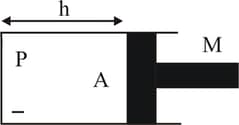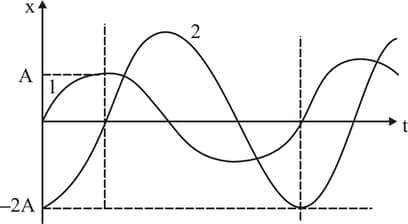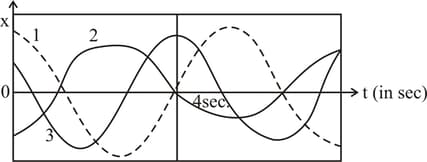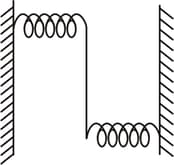Embibe Experts Solutions for Chapter: Simple Harmonic Motion, Exercise 4: Exercise-4
Embibe Experts Physics Solutions for Exercise - Embibe Experts Solutions for Chapter: Simple Harmonic Motion, Exercise 4: Exercise-4
Attempt the practice questions on Chapter 19: Simple Harmonic Motion, Exercise 4: Exercise-4 with hints and solutions to strengthen your understanding. Alpha Question Bank for Medical: Physics solutions are prepared by Experienced Embibe Experts.
Questions from Embibe Experts Solutions for Chapter: Simple Harmonic Motion, Exercise 4: Exercise-4 with Hints & Solutions
A cylindrical piston of mass slides smoothly inside a long cylinder closed at one end, enclosing a certain mass of a gas. The cylinder is kept with its axis horizontal. If the piston is disturbed from its equilibrium position, it oscillates simple harmonically. The period of oscillation will be (process is isothermal)

A U-tube contains mercury of total length as shown and is disturbed so that it oscillates back and forth from arm to arm. If we neglect friction, the period of oscillation is:

The time period of a particle in simple harmonic motion is equal to the smallest time between the particle acquiring a particular velocity . The value of is:
The oscillations represented by curve in the graph are expressed by equation . The equation for the oscillations represented by curve is expressed as:

A particle is moving along the-axis under the action of the force . At , the particle passes through the origin and at its speed is . The amplitude of the motion is:
Graph shows the curves for three experiments involving a particular spring-block system oscillating in SHM. The kinetic energy of the system is largest at for the situation:

The mass and diameter of a planet are twice those of earth. The period of oscillation of the pendulum on this planet will be (If it is the second's pendulum on earth)
A uniform rod of length and mass are pivoted at the centre. Its two ends are attached to two springs of equal spring constant . The springs are fixed to rigid supports as shown in the figure, and the rod is free to oscillate in the horizontal plane. The rod is gently pushed through a small angle in one direction and released. The frequency of oscillation is:

